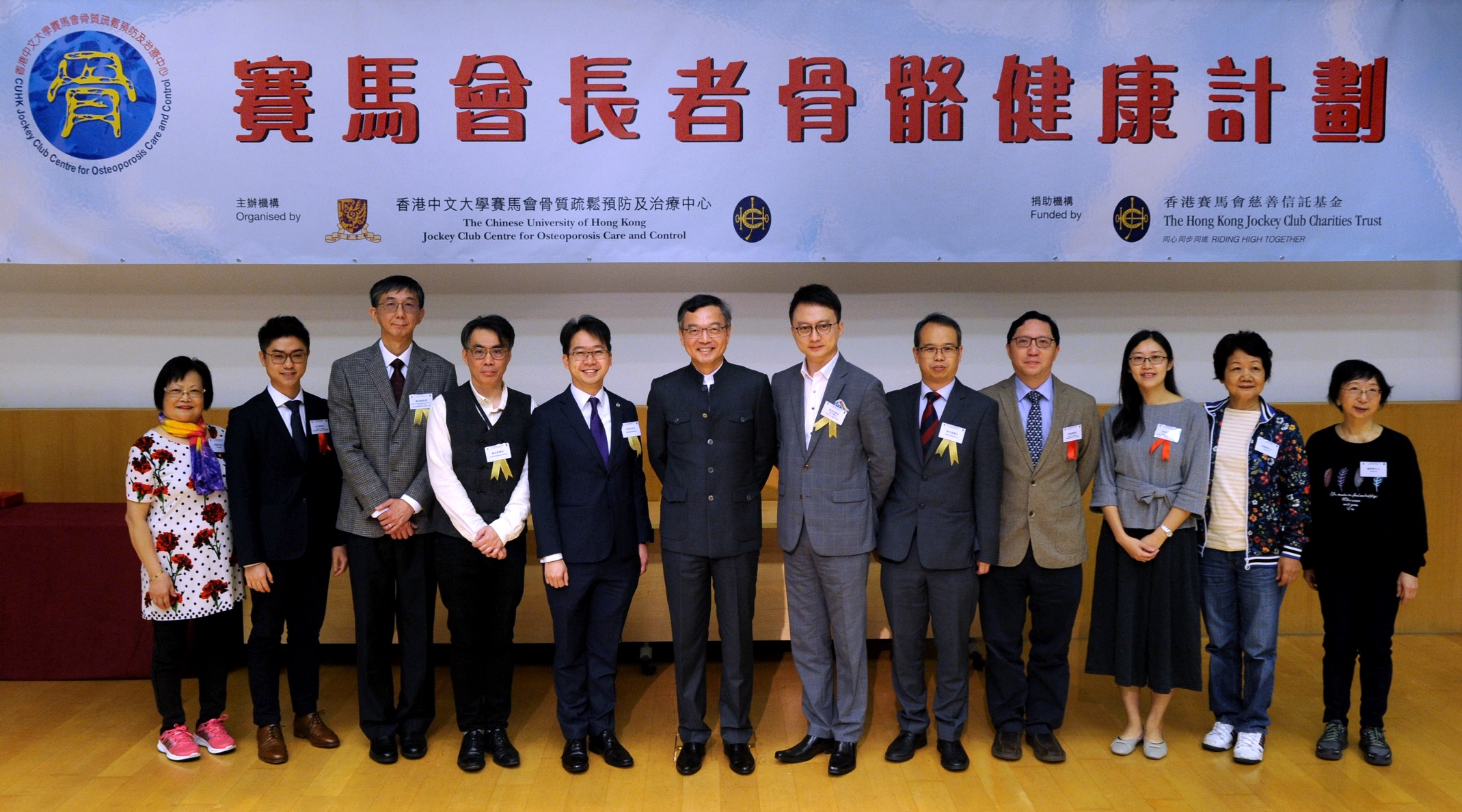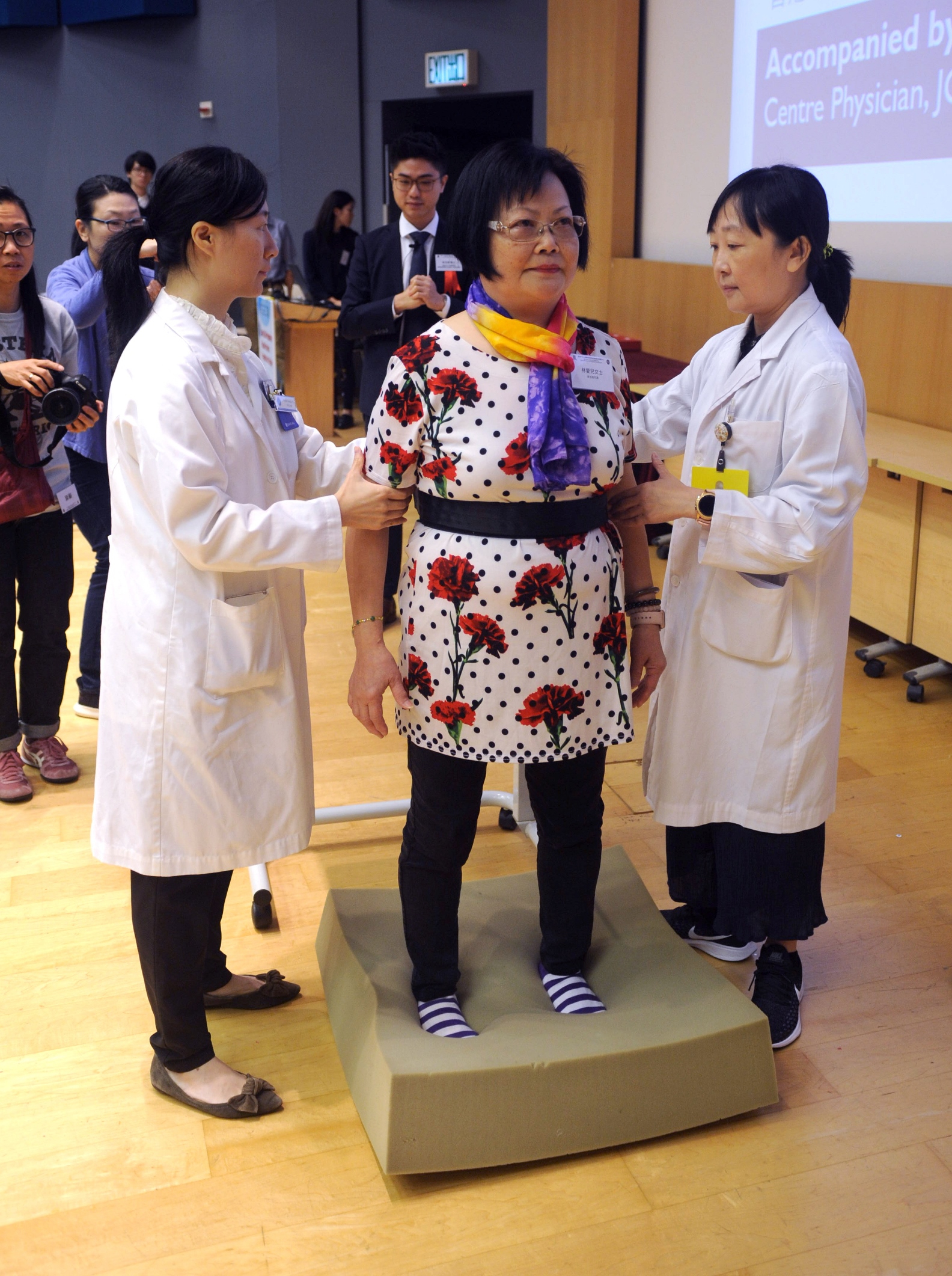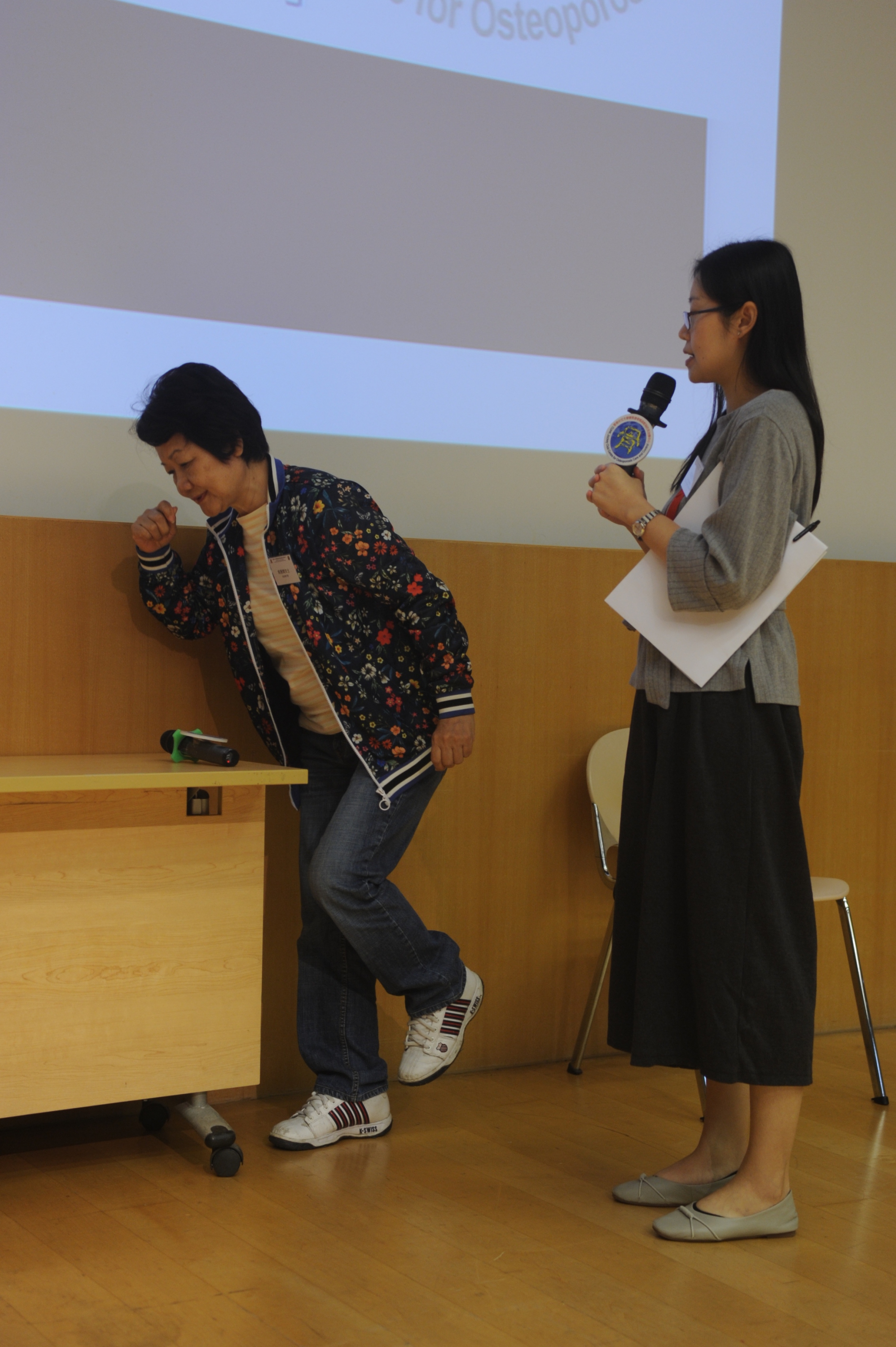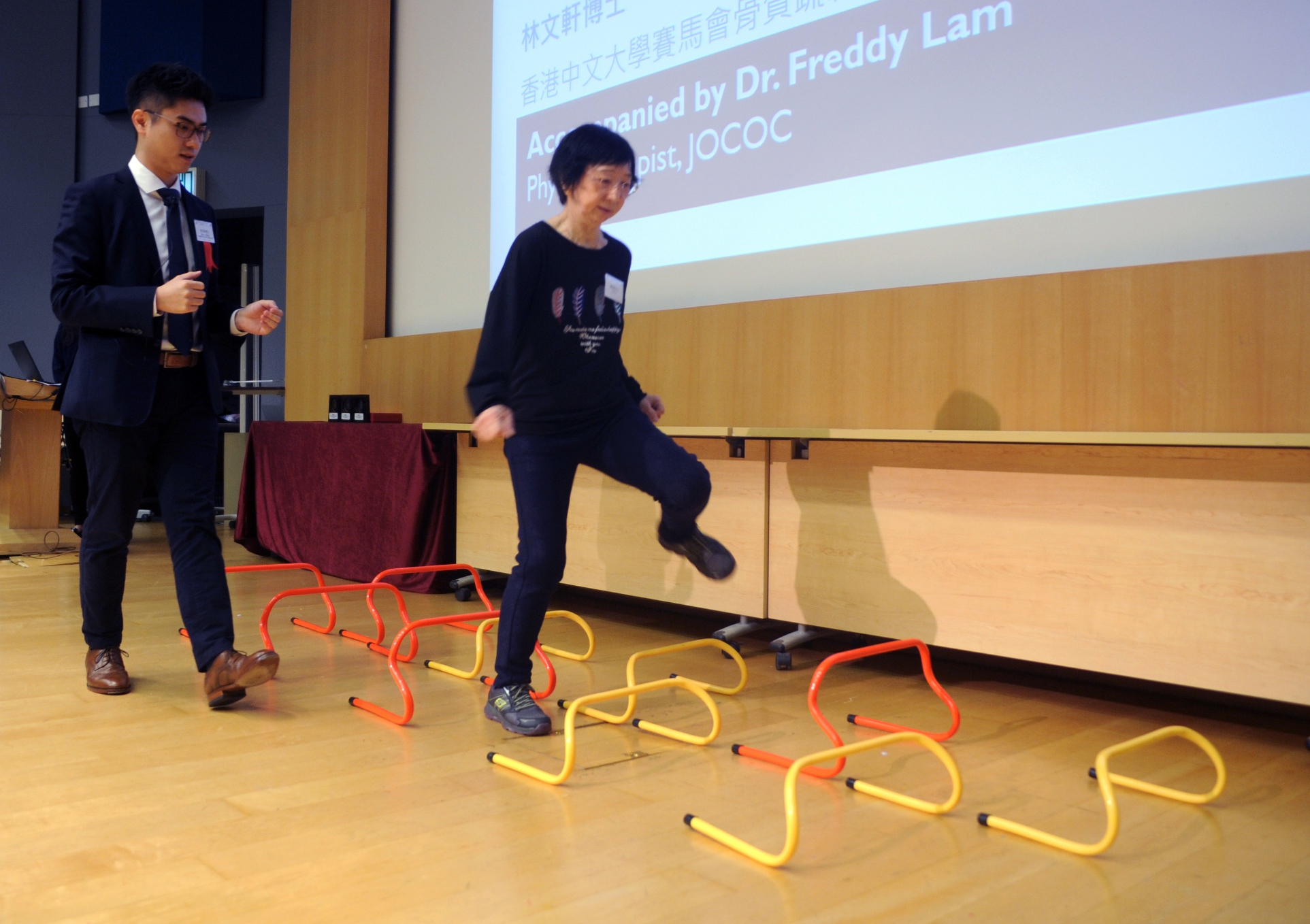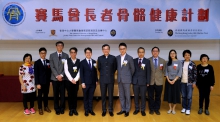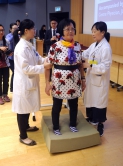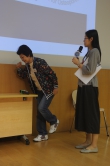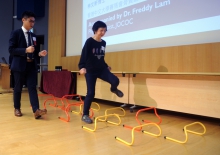CUHK
News Centre
Assessment Conducted by CUHK Jockey Club Centre For Osteoporosis Care and ControlReveals 30% of 1,500 Elderly Fallers Fall Again within 1 Year with Increased Fracture Risk
Osteoporosis can cause fractures, especially hip fracture, which is the common factor leading to disability and death among the elderly. An ageing population increases the odds of related cases and results in mounting stress on medical services. To lower the risk of osteoporosis, The Chinese University of Hong Kong Jockey Club Centre for Osteoporosis Care and Control (the Centre) has proposed remedies and has launched the “Jockey Club Programme for Falls & Fractures Prevention for the Elderly” funded by the Hong Kong Jockey Club Charities Trust in 2017. Up till now, over 1,500 elderly people with a history of falls went through risk assessments on falling and fracture and follow-ups, for free. Findings revealed that around 40% of the participants have a “moderate” to “very high” risk of falling. For the elders who are in the “high” to “very high” fall risk category, 70% of them are aged 70 or above.
The participants in the programme are all seniors over the age of 60 who have fallen in the past 12 months. The data show that 30% of them will fall again within one year. At the same time, these elderly people have a higher prevalence of osteoporosis. Elderly fallers with poor balance are therefore at very high risk of osteoporotic fractures, especially hip fractures. Therefore, the elderly should pay attention to their bone health after the first fall. They need to put extra effort into anti-fall exercise training and seek a doctor’s advice on bone density checking.
The programme also provides the elderly with education and training to improve their fall prevention awareness and capability. To date, over 1,500 elderly people went through assessments, and more than 400 of them completed or are still undergoing anti-fall exercise training instructed by a physiotherapist or occupational therapist. The Centre keeps track of each participant’s fall and fracture cases every three months for a year. The programme is expected to effectively prevent falls among the elderly through data analysis, thereby reducing their fracture rate.
Health Programme for Better Fall Prevention
In 2017, the Centre launched a three-year scheme, namely “Jockey Club Programme for Falls & Fractures Prevention for the Elderly” which set to provide risk assessments for 2,100 elderly people aged 60 or above who have had tumbles over the past year. Participants were assessed by medical professionals for fall and fracture risk. They were then assigned to receive either fall prevention exercises training or a Lifestyle-integrated Functional Exercise (LiFE) Programme based on different levels of risk. This serves the purpose of increasing their knowledge and capability in fall prevention.
In the programme’s interim analysis, over 1,500 elderly people have completed assessments so far. Findings show that around 40% (37%) of the participants have a “moderate” to “very high” risk of falling. The odds increase with age. 70% of the “high-risk” to “very high risk” groups are elder fallers aged 70 or above.
Disability and Death Due to Fall and Fracture
Professor Timothy Chi Yui KWOK, Director of The Chinese University of Hong Kong Jockey Club Centre for Osteoporosis Care and Control, said “Many elderly people fall due to poor vision, cognitive impairment, loss of muscle mass, poor balance and other reasons. 1 in 5 elderly people aged 65 or above, on average, have had fall accidents over the past year. After one-year post-programme follow-ups with 244 participants who have had at least one fall accident prior to their participation, 30% of them have had recurrent fall within one year”, he said.
He added that the “Jockey Club Programme for Falls & Fractures Prevention for the Elderly” has so far offered assessments and analyses to over 1,000 elderly people from every district of Hong Kong since its inception. Findings showed that the odds of recurrent falls are not low, which calls for attention. If an effective fall and fracture prevention scheme for the aged can be started in the community, the hospital admission rate and mortality rate caused by fractures in the elderly is expected to reduced.
Dr. Dicky Tak Kee CHOY from The Chinese University of Hong Kong Jockey Club Centre for Osteoporosis Care and Control, stated, “The report revealed that female fallers have a higher fall risk compared with the male. Data also indicate that our seniors commonly showed weaknesses in their lower limb muscle strength, balance control and vision. As the prevalence of osteoporosis is not rare amongst older ladies, they should be the group with the highest fracture risk. They should actively control bone loss and do anti-fall training.”
According to Professor Kwok, the programme not only offers education and training to the elderly, but also increases their ability to prevent falls and fractures. Workers from welfare organisations for the elderly are also provided with an instructor training course which enables them to promote fall prevention education in their community. All data collected from the programme will be analysed in 2020. Hopefully, the prevention programme, including assessment, examination, exercise intervention therapy and home-based Lifestyle-integrated Functional Exercise (LiFE), can effectively lower the risk of recurrent falls among our seniors.”
Call for Participation in Every District
The programme is now recruiting participants in the third round of assessments. After completing the assessment, each participant is given six sessions of home evaluation conducted by an occupational therapist along with instructions on LiFE. The elderly people residing in different districts, from Mei Foo to Prince Edward (MTR Tsuen Wan Line), from Prince Edward to Lam Tin (MTR Kwun Tong Line), from Kowloon Tong to Sheung Shui (MTR East Rail Line) and from Tai Wai to Ma On Shan (MTR Ma On Shan Line) are welcome to sign up for the programme. For those who are interested in joining the programme, they can register online (http://www.jococ.org/faller.htm). For enquiry, please call 2347 3855.
About “Jockey Club Programme for Falls & Fractures Prevention for the Elderly”
Since 2017, The Chinese University of Hong Kong Jockey Club Centre for Osteoporosis Care and Control with the donation from Hong Kong Jockey Club Charities Trust has introduced a three-year programme targeting 2,100 people aged 60 or above who had falls over the past year. Risk assessments on falling and fractures conducted by medical professionals have been provided to the participants. The evaluation covers cognitive health assessment, simple vision test, muscle strength and walk performance test, as well as balance and fall risk assessment. A dual X-ray absorptiometry scan on bone density will also be performed.
After completing the assessment, the participating elderly will be given an explanation of their assessment results along with professional advice from registered nurses. They will be assigned different training programmes based on their risk level for falling, so as to increase their fall prevention knowledge and capability. If necessary, participants will be referred to doctors for a further medical check-up and treatment advice.
About The Chinese University of Hong Kong Jockey Club Centre for Osteoporosis Care and Control (JOCOC)
Founded in 2001 with a donation from Hong Kong Jockey Club Charities Trust, JOCOC has been on a mission to promote healthier bone for all citizens, upgrade the quality of life for osteoporosis sufferers, make an all-out effort to run public campaigns on osteoporosis prevention and provide medical check -ups, diagnosis and treatment for osteoporosis sufferers. It also aims to set up related recovery and support services alongside the provision of clinical training on osteoporosis for medical professionals.
Moreover, the Centre has been conducting extensive scientific projects on osteoporosis, including genetic studies, large-scale clinical and drug trials, epidemiology of osteoporosis and its follow-up scheme, and collaborative programmes and campaigns for osteoporosis in Hong Kong and elsewhere.
The Lifestyle-integrated Functional Exercise (LiFE) training programme targets individuals who prefer to exercise at home. Through providing home visit support and incorporating the exercise in daily activities, a previous study found that over 75% of the elderly adhered to the LiFE training programme after 6 months and the incidence of falls was reduced by 31% in the one-year follow-up. The JOCOC is one of the first centres to incorporate the LiFE programme in Hong Kong. To further improve the effectiveness of the programme, home safety assessment and advice will also be given in the home visits. LiFE originated from Prof Lindy Clemson of University of Sydney, Australia.
For more information regarding our Centre and the activities, please refer our website http://www.jococ.org or Facebook: 中大骨質疏鬆預防及治療中心 JOCOC CUHK。
Professor Timothy KWOK (3rd from left), Director of the CUHK Jockey Club Centre for Osteoporosis Care and Control, takes the group photo with the team of the Jockey Club Programme for Falls & Fractures Prevention for the Elderly and the guests attending the conference, includes Dr. Ching-choi LAM (6th from left), Chairman of Elderly Commission, Mr. Horace LIT (5th from left), Senior Charities Manager of The Hong Kong Jockey Club, and Professor Francis CHAN (6th from right), Dean of the Faculty of Medicine at CUHK.
Ms LAM, a 62-year-old who has joined the Jockey Club Programme for Falls & Fractures Prevention for the Elderly, demonstrates the balance test for fall risk assessment with the assistance of medical staff.
Ms Yiu (left), 63, was assigned to receive Lifestyle-integrated Functional Exercise (LiFE), and her occupational therapist designed her training programme based on her home environment and daily habits.


